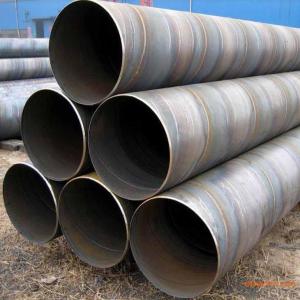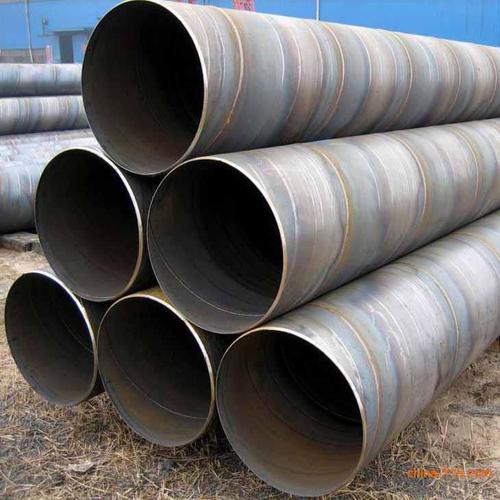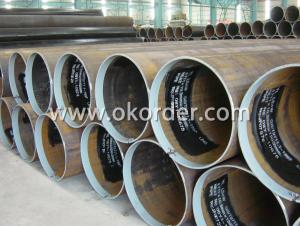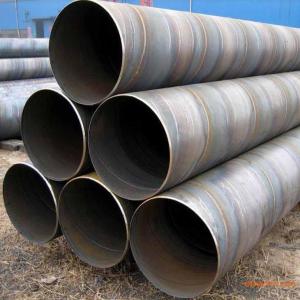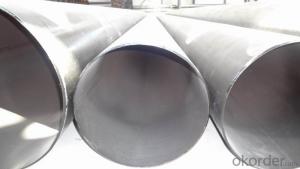API 5L High Quality SSAW Steel PIPE Welding
- Loading Port:
- Tianjin
- Payment Terms:
- TT or LC
- Min Order Qty:
- 25 m.t.
- Supply Capability:
- 10000 m.t./month
OKorder Service Pledge
OKorder Financial Service
You Might Also Like
We are company that have many years experience and professional manager team and engineer team and sales team, sure we will provide you high quality of pipe and professioanl service.
Seamless pipe possesses a hollow section and without seam around the strip steel. It is made with solid bar or steel ingot by perforating machine. As the facture process does not include any welding, seamless pipes are considered to be stronger and more durable. Generally speaking, seamless pipe has better pressure resistance and security than other classifications, and was usually more easily available than welded pipe.
2、Main Features of the Seamless Pipe:
• High working accuracy
• High strength
• Small inertia resistance
• Strong therming dissipine ability
• Good appearance
• Reasonble price
3、Seamless Pipe Specification:
Standard | GB, DIN, ASTM ASTM A106-2006, ASTM A53-2007 |
Grade | 10#-45#, 16Mn 10#, 20#, 45#, 16Mn |
Thickness | 8 - 33 mm |
Section Shape | Round |
Outer Diameter | 133 - 219 mm |
Place of Origin | Shandong, China (Mainland) |
Secondary Or Not | Non-secondary |
Application | Hydraulic Pipe |
Technique | Cold Drawn |
Certification | API |
Surface Treatment | factory state or painted black |
Special Pipe | API Pipe |
Alloy Or Not | Non-alloy |
Length | 5-12M |
Outer Diameter | 21.3-610mm |
Grade | 20#, 45#, Q345, API J55, API K55, API L80, API N80, API P110, A53B |
Standard | ASME, ASTM |
1) Material:20#(ASTM A 106/A53 GRB.API5LGRB,GB),45#,16Mn,10#.
2) Specification range: OD: 21.3-610mm, WT:6-70mm, length:6-12m or according to the requirement of clients.
3) Executive standards: GB, ASME API5L.ASTM A 106/A53,Despite of the above standards, we can also supply seamless steel pipe with standard of DIN, JIS, and so on, and also develop new products according to the requirements of our clients!
4) Surface: black lacquered, varnish coating or galvanized.
5) Ends: Beveled or square cut, plastic capped, painted.
6) Packing: bundles wrapped with strong steel strip, seaworthy packing.
4、Packaging & Delivery:
Packaging Details: | seaworthy package, bundles wrapped with strong steel strip |
Delivery Detail: | 15-30days after received 30%TT |
5、FAQ of Seamless Pipe:
①How is the quality of your products?
We have many years business experience in this area, and we have professional engineer and manager team and sure we can provide you high quality production and professional service.
②How about price?
Yes, we are factory and be able to give you lowest price below market one, and we have a policy that “ for saving time and absolutely honest business attitude, we quote as lowest as possible for any customer, and discount can be given according to quantity”,if you like bargain and factory price is not low enough as you think, just don’t waste your time.Please trust the quotation we would give you, it is professional one.
③Why should you chose us?
We can give you both.Additionally, we can also offer professional products inquiry, products knowledge train(for agents), smooth goods delivery, exellent customer solution proposals.Our service formula: good quality+good price+good service=customer’s trust
SGS test is available, customer inspection before shipping is welcome, third party inspection is no problem.
6、Seamless Pipe Images:
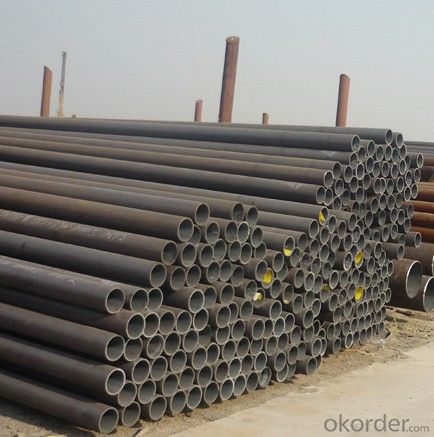
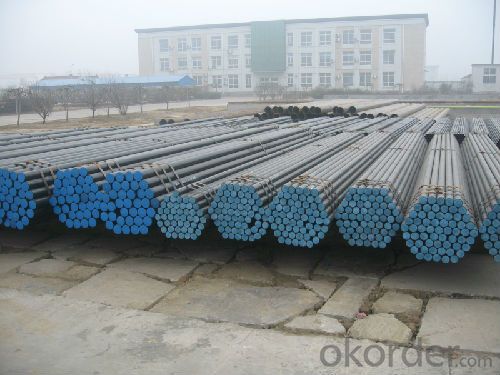
- Q: Can steel pipes be used for sewer systems?
- Yes, steel pipes can be used for sewer systems. Steel pipes are commonly used in sewer systems due to their durability, strength, and resistance to corrosion. They are able to withstand the harsh conditions and high pressure of sewage flow, making them a reliable choice for sewer infrastructure.
- Q: Is steel pipe made of profiles?
- According to the shape of the cross-section, the steel is generally divided into profiles, plates, pipes and metal products in four categories.Therefore, the steel pipe belongs to the pipe, not the profile.
- Q: How many fasteners are there in a ton of steel tubes?
- The fastener generally refers to the intermediate connecting parts connecting two members, in the construction project for external diameter of steel pipe scaffold with 48mm fixation, the fastener is divided into rectangular fastener (cross directional fastener fastener) rotary fastener (universal movable fastener fastener) (a direct docking fastener fastener fastener) etc..
- Q: How does the price of steel pipes vary based on market demand?
- The price of steel pipes can vary based on market demand as it follows the basic economic principle of supply and demand. When the demand for steel pipes is high and the supply is limited, the price tends to increase. Conversely, when the demand is low and there is excess supply, the price tends to decrease. Factors such as infrastructure projects, industrial growth, and construction activities heavily influence the demand for steel pipes, thus impacting their price in the market.
- Q: What are the industries that commonly use steel pipes?
- Some of the industries that commonly use steel pipes include construction, oil and gas, water and wastewater treatment, mining, manufacturing, automotive, and infrastructure development.
- Q: Can steel pipes be used for hydropower generation?
- Indeed, the utilization of steel pipes is possible for the generation of hydropower. Within hydropower systems, steel pipes find widespread application in various contexts like penstocks and pipelines. Penstocks, characterized by their large size, are responsible for transporting water from a reservoir to a turbine, facilitating the conversion of the water's kinetic energy into rotational energy. Consequently, these pipes necessitate robustness and longevity to endure the immense water pressure and structural weight. Furthermore, steel pipes are also employed for pipelines, facilitating the transportation of water from the turbine back to the river or reservoir. Ultimately, steel pipes are an indispensable element in the generation of hydropower, as they possess the necessary strength, durability, and resilience to withstand the challenging conditions associated with water flow.
- Q: Can steel pipes be used for fencing or railing?
- Yes, steel pipes can be used for fencing or railing. Steel pipes are strong, durable, and resistant to corrosion, making them a suitable option for fencing or railing applications. They can provide a sturdy and secure barrier while also offering an aesthetically pleasing look.
- Q: How are steel pipes used in the construction of wind farms?
- Steel pipes are used in the construction of wind farms for various purposes, such as supporting wind turbine towers, providing a strong foundation for the turbines, and transmitting electricity generated by the turbines to the power grid.
- Q: Are steel pipes resistant to chemicals?
- Yes, steel pipes are generally resistant to chemicals. However, their resistance may vary depending on the specific type of chemical and the grade of steel used. Some chemicals may cause corrosion or degradation of the steel over time, so it is important to consider the compatibility of the pipe material with the intended chemicals before use.
- Q: Are steel pipes resistant to impact or external forces?
- Steel pipes are renowned for their resistance to impact and external forces. Their high strength and durability render them perfect for a wide range of applications, notably in the realm of piping. These pipes possess the remarkable ability to endure external forces, encompassing impact, pressure, and vibrations. Consequently, industries necessitating steadfast and robust piping systems, like oil and gas, construction, and infrastructure, frequently opt for steel pipes. Furthermore, when confronted with extreme conditions, steel pipes are less prone to cracking or breaking in comparison to other materials. Nonetheless, the extent of resistance to impact and external forces may hinge upon the specific grade and thickness of the steel employed in the pipes.
Send your message to us
API 5L High Quality SSAW Steel PIPE Welding
- Loading Port:
- Tianjin
- Payment Terms:
- TT or LC
- Min Order Qty:
- 25 m.t.
- Supply Capability:
- 10000 m.t./month
OKorder Service Pledge
OKorder Financial Service
Similar products
Hot products
Hot Searches
Related keywords
